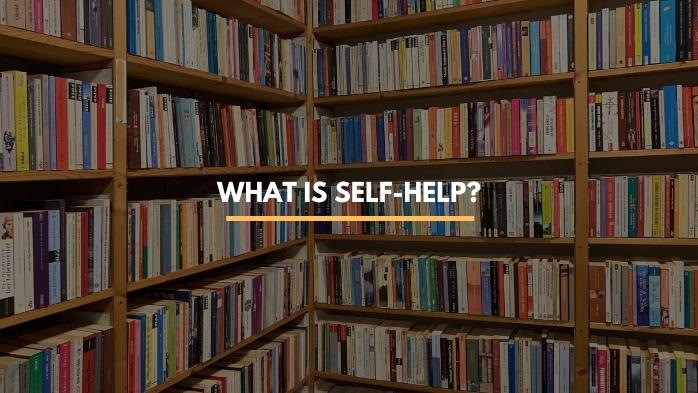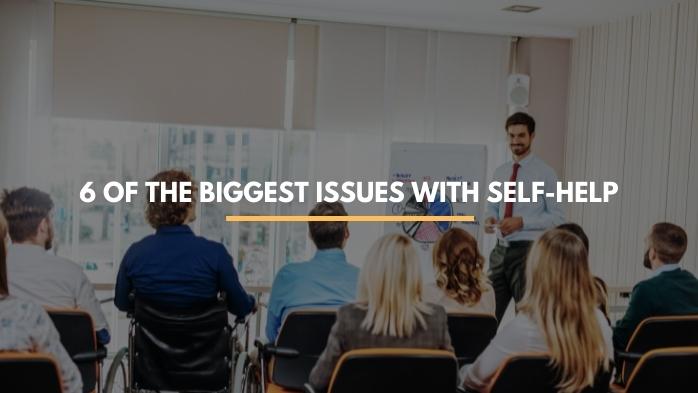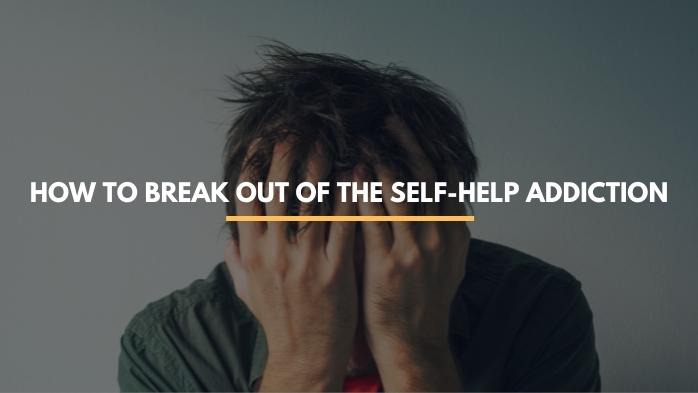Self-Help Isn’t Helping. Here’s 6 Reasons Why (and What Will)
Self-Help.
Those words are cringeworthy to some, money in the bank to others, and twitch-inducing to many.
Self-help and self-development have been getting roasted in the public sphere for many decades…but the numbers don’t lie – it’s a 9.6 billion dollar industry. Yes, 9.6 BILLION.
And that number is getting bigger by the day. So, it ain’t going nowhere.
But does it actually work? In this article I’m going to dive into 6 reasons why self-help doesn’t work for many people and how you can be one of the few that it does work for.
- Ways to start implementing concepts you find in self-help
- How to filter out the good from the bad when it comes to self-help and self-development
- The only real way to improve your life
This article is also available as a podcast:
What is Self-Help?

Here’s the almighty Wikipedia’s definition:
self-guided improvement —economically, intellectually, or emotionally—often with a substantial psychological basis.
Let’s expand this a little. Anything that brings you closer to that person who you see in your mind’s eye – whether it be buying an audiobook on how to manage your finances, a new exercise program, a philosophical book with the intention of strengthening your mind – is all self-help.
Pretty much anything that is non-fiction, you can consider it “self-help”.
(And yes, before you ask – Unstoppable Rise is indeed “self-help”.)
Why are people spending money on this (if it is bullshit)?
We live in very anxiety-producing times.
Many people are wondering if we’re gonna tip into another recession, another world war, etc, people are always worried about something.
To prevent this anxiety, some people just want something that will provide all the answers.
Here’s the problem though:
Self-help doesn’t work for most people.
Self-help does not work for the majority of people. in fact, it can even make things worse.
Many people who do these courses and such fall back into their old habits and routines with alarming rapidity and contribute to that 9.6 billion dollar figure.
I’ll say this: if self-help and self-development was so effective, we’d all be ripped as fuck with six pack abs, great health, a positive attitude, and the life of our dreams. But that’s obviously not the case.
Now, here’s the six main reasons why self-help does not work for the majority of people.
6 of the Biggest Issues With Self-Help

Reason # 1. Pollylollyanna
A lot of self-help books tend to be very idealistic.
It’s fine to be idealistic, but this needs to be tempered with reality.
It gets REALLY bad when you start to venture into New Age metaphysical ramblings (especially from people who have no real background in this information). This line of thinking can be very dangerous.
Many people just do not have the mental discipline, training, or patience to take advantage of the true essence of these teachings, so the spirit of them gets lost in the mix.
Reason # 2. Analysis Paralysis
Famous self-help guy Earl Nightingale said someone asked a doctor :
what’s wrong with men today?
This doctor said:
men simply don’t think.
I agree. Somewhat.
We definitely do a lot of thinking. We are a culture obsessed with anxiety and overthinking. Nearly 1 in 5 Americans has an anxiety disorder.
Repetitive thought making you circle round and round like a fucking Looney Toon. And of course, doing and saying the same things over and over again is the definition of insanity.
This excessive thinking propels us to click over to Amazon and buy the next self-help book. Then when we DO read it, we’re wondering if we’re doing it right, like Mr. or Mrs. [Insert your favorite self-help guru here].
As a result, we take no action and we are in the same place as we were before.
Reason # 3. Information Overload
We’re exposed to a barrage of information on a daily basis. Why add four more self-help books to that clutter?
You’ll most likely forget about what you read (unless you write it down) and it will be another piece of your precious time that’s been wasted reading something that just makes you “feel good”, while producing no actual results.
This information overload feeds back into the previous reason and creates a vicious cycle of self-doubt and inner resistance.
Reason # 4. The “Pacifier Effect”
I made this up, but let’s roll with it. It’s an interesting phenomenon I see within the self-help and self-development sphere.
Let’s use John as an example.
John goes out and buys a new copy of Think and Grow Rich. Fired up from his new read, he decides to go on a self-help book reading spree. During the course of his reading, he then encounters an idea that contradicts one he read in Think and Grow Rich! Later on John encounters a problem that can be solved using the teachings found in both of these books. What should he do?
John should think for John…but he doesn’t – so he does jack and shit. He would have taken more action than if he didn’t read those books in the first place.
Instead of being empowered, many readers of self-help books are put in a position of helplessness. These readers need to consult the self-help guru of their choice when it comes to certain aspects of their life that they should be able to deal with.
These people can’t think for themselves and think that every single problem that have will be solved by reading these books. Not only do they waste more time on inaction but they open themselves up to information overload and analysis paralysis.
Great.
Reason # 5: Rewarding…but for what?
Admit it… you get a dirty little high when you read a self-help book. You feel like you’re gaining some type of insider information that will put you above everyone else.
But why?
Well, there’s this awesome little chemical called “dopamine” that does that
Dopamine is a motivational neurotransmitter that’s released whenever we do anything that’s rewarding for our survival.
As you read a self-help book, your brain is releasing dopamine to signal that this information is beneficial to you and will help you move up in the world.
When you read self-help books, you are tricking your reward center to thinking that you “did” something when you actually didn’t move the needle whatsoever.
The consequence?
By tricking the reward center that you’re doing work, you make it harder to do ACTUAL work. Real work isn’t as stimulating as reading one of those self-help books because you don’t see the results immediately.
This is why addictions like Internet addiction are so rampant in our society. It’s easier to spectate than it is to create, especially in our risk-averse society.
Reason # 6: Diminishing Returns
Ask yourself: do you really need to read that next book?
Didn’t you already listen to a version of this audio program?
Haven’t you already watched a video like this?
Do you really need another book on how to be productive?
Do you really need another book on “how to run a business” even though you know deep down inside you won’t?
Granted, if you’re starting from ground zero and you have no knowledge of self-help concepts, some will certainly do you good. But after a while, it’s like reading the same stuff over and over again.
Eventually you’ll just get a point where you’ll ask:
Didn’t I already read this?
But the catch is – it’s a different book.
How to Break Out of the Self-Help Addiction

The overwhelming glut for self-help stems from procrastination.
We all want to make a difference in the world…Just not today.
I’ll read about it first, then I’ll go out and change the world.
Procrastination is the main culprit you have to eliminate if you truly want to be free of the black hole of self-help.
You’re probably reading this article to procrastinate, if so…think of it as “proactive procrastination”.
(Didn’t see that coming!)
Work with what you have
One of the main symptoms of the addiction to self-help is a repeat buying of materials, even though you don’t need them.
If you buy a ton of books and courses on how to exercise before you even start exercising, then you’re procrastinating.
My advice?
Read what you already have.
I’m not talking about once.
I’m not talking about twice, or even three times.
Re-read it until you internalize it and REALLY understand what the author is saying. Then, graft it onto your life philosophy.
New to self-improvement? Start here. 👉 Self-Improvement for Young Men
Don’t impulse shop
You’re more likely to make rash decisions when you’re hungry, angry, lonely, tired, or stressed (HALTS).
But our trump card is the prefrontal cortex. This is the seat of your willpower and your decision-making capabilities.
You can choose to not click “add to cart” when it comes to that book or audio program.
You can choose not to view that video.
You have a choice. You always have and always will.
Act, then course correct
You already know what you need to do to achieve [BLANK].
You already know what you need to do to gain muscle or lose weight. It’s not magic.
Go to the gym. Eat healthy foods. Eat more than you burn. Sleep well. That’s it. Well…there’s a bit more than that, but there’s no reason to over-complicate things in the beginning.
What if you acted before you were necessarily “ready”? You’d probably end up achieving your goal in a shorter amount of time than if you read ALL the books in the world.
When you took your first job, you didn’t know everything in that field. You learned along the way.
If you wait until you know everything about something, you’ll never do it.
You get going and then change course along the way. Of course, don’t be an ignoramus and launch blindly…but don’t fall victim to the idea of “getting ready” either. If you encounter a certain problem, THEN you can get a book or course to help you out.
Life isn’t lived between the covers of a book or on the Internet.
Life isn't lived between the covers of a book or on the Internet. Share on XHere’s my list of approved self-development books, so you don’t waste your time.
The Final Solution
When I first started getting into self-development and self-help, I thought it was an incredible thing.
I didn’t learn any of this in school, so being exposed to this stuff was mind-blowing.
I bought self-help book after self-help book in addition to learning a lot of stuff through videos and audiobooks…then I started to run into diminishing returns.
I soon came to the conclusion that I would not buy a self-help book unless I had a pressing problem that needed to be solved.
I already read a lot of the classics…while skipping a few others.
And to be honest? I doubt the quality of my life would have increased dramatically after reading the “classics” I missed.
My understanding of the books I now have are deeper and richer due to repeated reads. I’m very certain I could do more plumbing if I needed to.
Once you get rid of this addiction to self-help, you will feel so much better. Trust me.
Now, I want to hear from you. Do you have an addiction to self-help materials? What are you going to do starting today to stop it? Let us know down below.

Good read was really getting stuck in this gibberish world of self-help and not getting anywhere!
Many thanks.
After reading your article about the 25 self-development books I was planning to read some of those recommended books. But then I stumbled upon this article and now I don’t know if I should. I’m a little bit confused so, how do I go about this? Thanks in advance.
Hans,
This article was centering around how self-help is useless if you don’t take action. Read the books, then take action on the concepts in the books. That’s the only way you’ll be able to properly utilize it.
Well, yeah, you make some very good points in your article. We also need to remember that “self-help” is an industry somehow like big pharma.